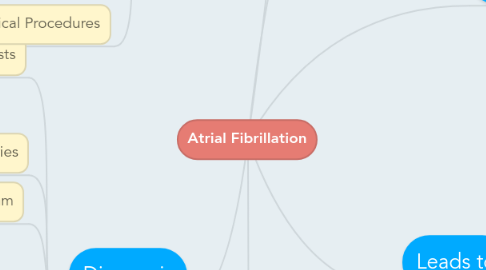Atrial Fibrillation
Taylor Gravesにより


1. Diagnosis
1.1. Specialists
1.1.1. Primary care doctors
1.1.2. Cardiologists
1.1.3. Electrophysiologists
1.2. Medical and Family Histories
1.3. Physical Exam
1.4. Diagnostic Tests and Procedures
1.4.1. EKG
1.4.2. Holter and Event Monitors
1.4.3. Stress Test
1.4.4. Echocardiography
1.4.5. Transesophageal Echocardiography
1.4.6. Chest X Ray
1.4.7. Blood Tests
2. treatment
2.1. Medications
2.1.1. Heart Rate Controlling
2.1.1.1. Beta blockers
2.1.1.2. Calcium channel blockers
2.1.1.3. Digoxin
2.1.2. Heart Rhythm Controlling
2.1.3. clottig
2.1.3.1. anticoagulants
2.1.3.2. antiplatelets
2.2. Non-surgical Procedures
2.2.1. Electrical cardioversion– the rhythm reset
2.2.2. electrical cardioversion
2.2.3. catheter ablation
2.3. Surgical Procedures
2.3.1. Pacemakers
2.3.2. Open-heart maze procedure
